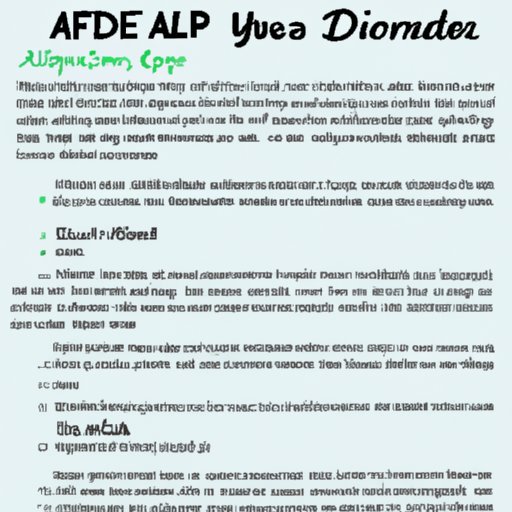Introduction
Financial aid is money provided by the government or other organizations to help students pay for college tuition, fees, and other related expenses. The purpose of financial aid is to make higher education more accessible and to ensure that no student has to miss out on the opportunity to pursue their dreams due to lack of funds. However, sometimes a student may need additional assistance beyond what they are offered initially. In such cases, they may need to write a financial aid appeal letter in order to request additional funds.

Outline the Steps for Writing an Effective Financial Aid Appeal Letter
Writing a successful financial aid appeal letter requires careful thought and planning. Here are the steps you should take to ensure your letter is professional and effective:
Research Relevant Information
Before you start writing your letter, it’s important to research the relevant information. Find out who the decision-maker is and review the institution’s guidelines for appealing financial aid decisions. Make sure you understand what kind of documentation is required and if there is a deadline for submitting your appeal.
Draft a Professional Letter
Once you have gathered all the necessary information, you can begin drafting your letter. Use a professional tone and be sure to include all the relevant details. Include your name, contact information, and the reason for your appeal. Explain why you need the additional funds and provide evidence to support your claim.
Proofread and Edit
Finally, once you have finished writing your letter, it’s important to proofread and edit it carefully. Check for any spelling or grammar mistakes, as well as any factual errors. Make sure your letter is clear and concise and avoid using overly technical language or jargon.
Explain the Reasons for Financial Aid Eligibility and How to Make a Case for It
When writing your financial aid appeal letter, it’s important to explain why you need the additional funds and how you meet the criteria for eligibility. According to a study conducted by the National Center for Education Statistics, “62% of undergraduate students receive some form of financial aid.” Here are some tips for making a case for your eligibility:
Demonstrate Need
When making your case for financial aid, it’s important to demonstrate your need. Explain your current financial situation and how the additional funds will help you cover your expenses. You can also provide evidence of any changes in your family’s financial circumstances since you first applied for aid.
Show Academic Improvement
If your grades have improved since you first applied for financial aid, be sure to include this information in your letter. Provide evidence of your academic progress and explain how the additional funds will help you continue to excel academically.
Highlight Extenuating Circumstances
Sometimes a student’s financial aid application may be denied due to extenuating circumstances beyond their control. If this applies to you, be sure to highlight these circumstances in your letter and explain how the additional funds will help you overcome them.
Provide Tips on How to Structure a Financial Aid Appeal Letter
Once you have outlined your reasons for needing additional financial aid, it’s time to structure your letter. Here are some tips for ensuring your letter is clear and organized:
Start with a Salutation
Begin your letter by addressing the decision-maker by their proper title. Use a polite and respectful tone throughout your letter.
Describe Your Situation
Provide a brief description of your current situation and why you need additional funds. Be sure to include any relevant details that may help your case.
Explain Why You Need Financial Assistance
Explain why you need the additional funds and provide evidence to support your claim. Be honest and direct in your explanation.
Include Supporting Evidence
In addition to explaining your need for financial assistance, it’s important to include any supporting evidence that may help your case. This could include documents such as transcripts, bank statements, and letters of recommendation.
Thank the Reader for Their Time
End your letter by thanking the reader for taking the time to consider your request. Express your appreciation for their consideration and state that you look forward to hearing from them soon.

Share Examples of Successful Financial Aid Appeal Letters
Reading through successful financial aid appeal letters can be helpful when writing your own. Here are three examples of letters that resulted in successful outcomes:
Sample 1
Dear [Name],
I am writing to appeal my financial aid award for the upcoming academic year. I am currently a full-time student at [University Name] and I am seeking additional funds to cover my tuition and living expenses.
My family recently experienced a significant decrease in income due to my father’s medical issues. As a result, we have been unable to keep up with our financial obligations and are struggling to make ends meet. I am confident that with additional financial assistance, I will be able to continue my studies without interruption.
Attached to this letter is a copy of my recent transcript, which shows that I have maintained a 3.5 GPA despite the financial hardship. I am also enclosing documents detailing my family’s current financial situation. I hope that these documents will help you understand my need for additional funds.
Thank you for taking the time to consider my appeal. I look forward to hearing from you soon.
Sincerely,
[Your Name]
Sample 2
Dear [Name],
I am writing to appeal my financial aid award for the upcoming academic year. I am an undergraduate student at [University Name] and I am seeking additional funds to cover my tuition and living expenses.
I was recently accepted into the honors program at my university, but due to my current financial situation, I am unable to accept the offer. My parents’ income has decreased significantly since I applied for financial aid and I am unable to cover the additional costs associated with the program without assistance.
I am confident that with additional funds, I will be able to take advantage of this amazing opportunity and continue my studies without interruption. Attached to this letter is a copy of my recent transcript, which shows that I have maintained a 4.0 GPA despite the financial hardship. I am also enclosing documents detailing my family’s current financial situation.
Thank you for taking the time to consider my appeal. I look forward to hearing from you soon.
Sincerely,
[Your Name]
Sample 3
Dear [Name],
I am writing to appeal my financial aid award for the upcoming academic year. I am currently a full-time student at [University Name] and I am seeking additional funds to cover my tuition and living expenses.
I am currently dealing with a number of extenuating circumstances, including a death in the family and a sudden job loss. These events have had a significant impact on my finances and I am struggling to make ends meet. I am confident that with additional financial assistance, I will be able to continue my studies without interruption.
Attached to this letter is a copy of my recent transcript, which shows that I have maintained a 3.8 GPA despite the financial hardship. I am also enclosing documents detailing my family’s current financial situation. I hope that these documents will help you understand my need for additional funds.
Thank you for taking the time to consider my appeal. I look forward to hearing from you soon.
Sincerely,
[Your Name]

Discuss Strategies for Working with Financial Aid Officers to Achieve a Favorable Outcome
Working with financial aid officers can be an intimidating process. Here are some strategies for ensuring a successful outcome:
Be Polite and Respectful
It’s important to maintain a polite and respectful attitude when interacting with financial aid officers. Show that you understand their role and appreciate the time they are taking to review your request.
Follow Up Promptly
Be sure to follow up promptly after submitting your appeal letter. This will show that you are serious about your request and will demonstrate your commitment to the process.
Stay Organized
Finally, it’s important to stay organized during the appeals process. Keep track of all the documents you submit and make notes of any conversations you have with financial aid officers. This will help ensure that you don’t miss any important deadlines or opportunities.
Conclusion
Writing a financial aid appeal letter can be a daunting task. However, with careful research, planning, and organization, it is possible to create an effective letter that will help you get the additional funds you need. Remember to explain your need for assistance and include any relevant evidence that may help your case. Additionally, remember to be polite and respectful when interacting with financial aid officers and follow up promptly after submitting your letter.
Summary of Key Points
In this article, we discussed the steps for writing an effective financial aid appeal letter. We explained the reasons for financial aid eligibility and how to make a case for it. We also shared tips for structuring a letter and examples of successful letters. Finally, we discussed strategies for working with financial aid officers to achieve a favorable outcome.
Call-to-Action
If you are in need of additional financial aid, writing a financial aid appeal letter is one way to make your case. Follow the tips outlined in this article to ensure your letter is professional and effective.
(Note: Is this article not meeting your expectations? Do you have knowledge or insights to share? Unlock new opportunities and expand your reach by joining our authors team. Click Registration to join us and share your expertise with our readers.)
